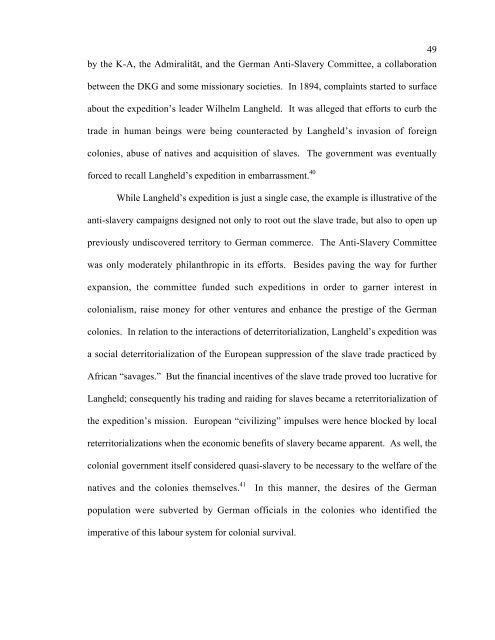A Deterritorialized History: Investigating German Colonialism ...
A Deterritorialized History: Investigating German Colonialism ...
A Deterritorialized History: Investigating German Colonialism ...
Create successful ePaper yourself
Turn your PDF publications into a flip-book with our unique Google optimized e-Paper software.
y the K-A, the Admiralität, and the <strong>German</strong> Anti-Slavery Committee, a collaboration<br />
between the DKG and some missionary societies. In 1894, complaints started to surface<br />
about the expedition’s leader Wilhelm Langheld. It was alleged that efforts to curb the<br />
trade in human beings were being counteracted by Langheld’s invasion of foreign<br />
colonies, abuse of natives and acquisition of slaves. The government was eventually<br />
forced to recall Langheld’s expedition in embarrassment. 40<br />
While Langheld’s expedition is just a single case, the example is illustrative of the<br />
anti-slavery campaigns designed not only to root out the slave trade, but also to open up<br />
previously undiscovered territory to <strong>German</strong> commerce. The Anti-Slavery Committee<br />
was only moderately philanthropic in its efforts. Besides paving the way for further<br />
expansion, the committee funded such expeditions in order to garner interest in<br />
colonialism, raise money for other ventures and enhance the prestige of the <strong>German</strong><br />
colonies. In relation to the interactions of deterritorialization, Langheld’s expedition was<br />
a social deterritorialization of the European suppression of the slave trade practiced by<br />
African “savages.” But the financial incentives of the slave trade proved too lucrative for<br />
Langheld; consequently his trading and raiding for slaves became a reterritorialization of<br />
the expedition’s mission. European “civilizing” impulses were hence blocked by local<br />
reterritorializations when the economic benefits of slavery became apparent. As well, the<br />
colonial government itself considered quasi-slavery to be necessary to the welfare of the<br />
natives and the colonies themselves. 41 In this manner, the desires of the <strong>German</strong><br />
population were subverted by <strong>German</strong> officials in the colonies who identified the<br />
imperative of this labour system for colonial survival.<br />
49
















